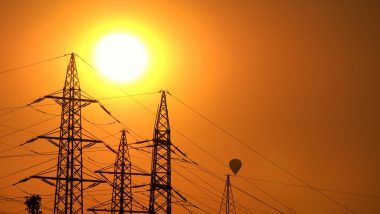Mumbai, March 28: Tata Power on Tuesday exuded confidence that the financial capital will be able to avoid a re-occurrence of an electricity outage courtesy of improved coordination between stakeholders and more investments in multiple areas, including cybersecurity.
The company, which competes with Adani Electricity Mumbai and claims to have a 70 per cent share in the transmission of the overall power used in the financial capital, is also confident of the upcoming summer season which witnesses a surge in demand passing off incident-free, its president for transmission and distribution Sanjay Banga told reporters here. Also Read | PAN-Aadhaar Linking: Govt Extends Deadline to Link Aadhaar Number With PAN Card, Know Step-By-Step Guide.
It can be noted that on October 12, 2020, there was a power outage which lasted up to 12 hours in some pockets of the financial capital. Many people blame the simultaneous failure of multiple lines that caused it, while some also blame it on a cyber attack. There have been two more outages of lesser magnitude after that as well. Power Minister RK Singh Dismisses Reports of Coal Crisis in India, Says Surge in Energy Demand Signals Recovery of Economy.
Vishwas Shrikhande, the chief of Mumbai transmission for the company, said a series of measures have been initiated following the outages, including a Rs 200 crore investment to up the transmission capacity for a line from Kalwa to Salsette to 1,800 MW from 1,200 MW.
He said the coordination with the state-level coordination committee has also gone up, which includes the formulation of standard operating protocols to avoid any incident and reacting swiftly and improving load dispatch settings with the Western Region Power Committee which will up the chances of islanding in a scenario of wide-ranging power failures.
Indian Institute of Technology-Bombay did a study and has run simulations under various scenarios for protection and load shedding in the grid, he said. When asked about cyber security, Shrikhande said the company has also invested in a new SCADA system to improve its security architecture.
The company feels the peak power demand in the city is likely to touch 4,000 MW this summer from the already increased 3,300 MW seen in recent days with the increase in temperatures.
Banga said the quantum of increase will be lower in Mumbai as compared to the rest of the country, because the per capita consumption of power is much higher in the city at over 2,100 units as against 1,200 units nationally.
Shrikhande said the company has invested Rs 2,300 crore in upping its transmission infrastructure over the last five years, which included replacing up to 90 per cent of the aged systems, and will pump-in another Rs 700 crore next fiscal as well on the transmission front itself.
Apart from that, it plans to invest Rs 550 crore over the next three years to install smart meters, its head of distribution for Mumbai Nilesh Kane said. At present, it has 7.68 lakh consumers, of which 1.25 lakh have smart meters, he said, adding that nearly 6.5 lakh of the overall consumers are residential.
Banga said it is also looking at applying for parallel electricity distribution licenses in various pockets of the country, where there is a concentration of demand like data centres or Special Economic Zones (SEZs) and where it can make power available at lower costs even after incurring the capital expenditure of installing a distribution network.
(The above story is verified and authored by Press Trust of India (PTI) staff. PTI, India’s premier news agency, employs more than 400 journalists and 500 stringers to cover almost every district and small town in India.. The views appearing in the above post do not reflect the opinions of LatestLY)













 Quickly
Quickly


